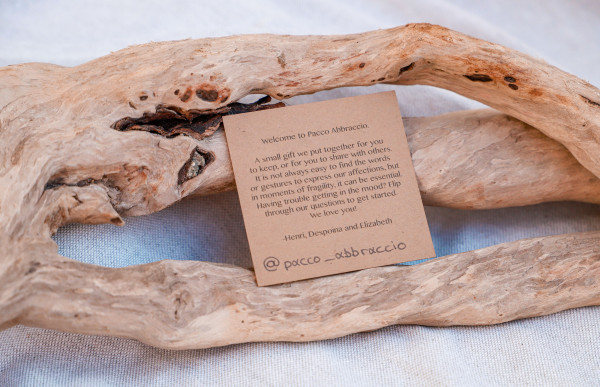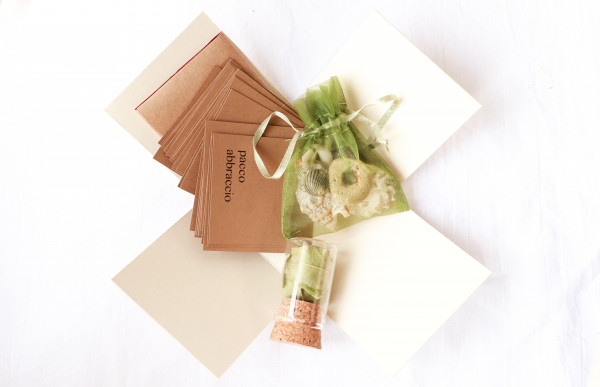MA Eco-Social Design: Project 1 by Kirsch Henriette Caroline, Maldari Elizabeth Ann, Tzirou Despoina | WS 2020
Pacco Abbraccio
This gift is for you to keep or share with others. Finding the words or gestures to express affection is not easy but in moments of fragility it can be essential. Having trouble getting in the mood? Flip through our questions to get started
text
Pacco Abbraccio focuses on mental health and emotional literacy through navigating this current, global crisis and having to stay at physical distance from loved ones. What if there was a medium for us to get to know ourselves more intimately while also getting closer to people we care about? This is the reason for making Pacco Abbracio. A small gift for everyone out there who is seeking deeper and more meaningful connections. A box made with love, for you to consider, express and receive affection. All you have to do is acquire one of our ready-made boxes or even visit our instagram page, download all the instructions and make your own version. Explore our question cards and let feelings unfold. You can either make this box for yourself, as a self-care kit, or for a person you adore, to express feelings, thoughts, unspoken words and intrigue a deeper understanding of each other. Unfolding the channels of emotions can be exciting yet intimidating. But how many times have you wondered how your loved ones really feel about you? Pacco Abbraccio is your chance to communicate, to the special people in your life, your inner self and your intimate side. Let them know they are being seen, heard, valued and appreciated. Give and receive without judgment and nourish every important relationship.

The Research and Design Process
The project presented here is the outcome of a three month long experimentation process to identify the right tools that would intrigue people to pursue and nourish meaningful connections. Starting with the general guideline of approaching the topic of mental health in a more playful and enjoyable way, the first approach was about giving people the language to talk about their feelings and their sensitive side. Given the fact that our senses are essential for how we perceive the world and interpret our emotions, we included them in our design research process by sharing a questionnaire focused on the way people feel and how their senses affect that; positively or negatively. The questions revolved around the way people experience and fight loneliness, how senses are connected to memories, what could trigger them and how specific sensorial input could improve the emotional state of the respondents. From the survey, two important points came up. Firstly, Covid affected to a great extend the feeling of loneliness and estrangement, and secondly, we noticed most people value their senses according to the simple physiological benefit, but did not connect the impact these senses have on their emotion and mood, unless prompted by our questions. This guided us into the direction of approaching mental well-being through emotions and not necessarily through the senses.
Initially, we attempted to find specific objects to put in our box that would help people explore their emotions and closeness to others. We sent out a few prototypes, but we discovered that finding relatable objects for every person was not easy.
We found that people recognized the value of expressing affection with one another and were also glad for an excuse to do so. Our recipients responded in a range of emotions from excitement to skepticism, however only one out of 15 people turned down the box.
Unwrapping a gift is a pretty universal language that provokes curiosity, excitement and openness, this prompted us to enrich our initial approach with this aspect and encourage people to dig deeper into their emotional and sensorial vaults in a pleasing and sweet-natured way.

text
Students:
Kirsch Henriette Caroline, Maldari Elizabeth Ann, Tzirou Despoina
Teaching Team:
Karl Emilio Pircher (Object–Spaces–Services)
Kris Krois (Communication–Interaction–Services)
Secil Ugur Yavuz (Design Research)
Alvise Mattozzi (Social Studies of Design)
Partner:
OfficineVispa
Municipality of Bolzano–Bozen (Ufficio Famiglia, Donna, Gioventù e Promozione sociale)
Links
Instagram